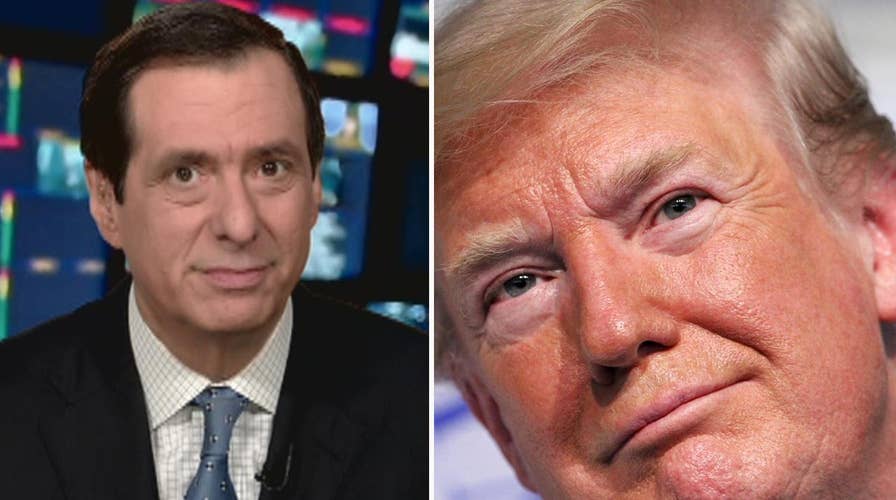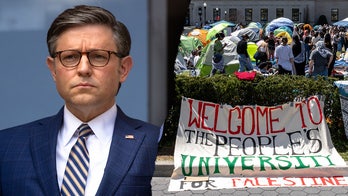Kurtz: Pardon me, Trump self-pardon debate is hypothetical
'MediaBuzz' host Howard Kurtz weighs in on the media debating President Trump's tweet that he could pardon himself, but won't need to.
There was a media eruption over Rudy Giuliani and his latest round of television appearances, turning on his answers to hypothetical questions, which are always dangerous.
I thought the journalistic reaction was a bit overheated. But then President Trump took it a step further yesterday. So there is clearly an aggressive strategy in place to attack the Mueller investigation and claim broad powers for the president to resist any effort to interview or subpoena him.
How much of this is saber-rattling and how much is active resistance is hard to determine. But the ramped-up rhetoric clearly has the press up in arms.
On ABC’s “This Week,” George Stephanopoulos asked Rudy Giuliani if the president has the power to pardon himself.
“He’s not, but he probably does,” Giuliani said. “He has no intention of pardoning himself.”
Chuck Todd asked the same question on “Meet the Press.” “Well, it's not going to happen,” Giuliani said. “So it’s a hypothetical point. I think the presidential power, there's nothing that limits the presidential power of pardon from a federal crime—not a state crime. President Trump is not going to do that.”
Those didn’t seem like particularly inflammatory answers, but the press was on fire with “TRUMP COULD PARDON HIMSELF” headlines, even though his lawyer said it’s not happening.
Now Rudy could have deflected it entirely as a hypothetical not worth answering, but the former prosecutor enjoys the back-and-forth.
The other part of the Sunday interviews dealt with the Trump team memo to Bob Mueller, leaked to the New York Times, asserting that the president can’t commit obstruction of justice because he can fire anyone in the executive branch. Therefore, the lawyers argued, he could blow off a Mueller subpoena to testify.
Giuliani didn’t go quite that far, saying: “I look at the obstruction part of the argument this way, he didn't obstruct. And we can win it on the facts. So, he wants to testify. Every lawyer he has, including this one, always wants their client not to testify.”
Giuliani also cited a previous DOJ opinion that a sitting president can’t be indicted.
But what really opened the floodgates was a separate interview with the Huffington Post.
“If he shot James Comey, he'd be impeached the next day,” Giuliani said. “Impeach him, and then you can do whatever you want to do to him.”
Okay, he really stepped in it. Of course it was an analogy based on an extreme example, but Giuliani allowed the president’s detractors to say his people were claiming he had the right to commit murder.
“Literally out of a tyrant’s playbook,” Joe Scarborough said.
(On his new prime-time show, CNN's Chris Cuomo asked Giuliani whether he regretted making the eye-popping comment about shooting Comey. Giuliani laughed, said that was the hypothetical question he was asked and called the notion "totally ridiculous.")
And then the president took to the Twitter.
Citing “numerous legal scholars,” Trump said: “I have the absolute right to PARDON myself, but why would I do that when I have done nothing wrong?”
That of course escalated the story—now it wasn’t just Rudy on talk shows—and the president followed up with this:
“The appointment of the Special Counsel is totally UNCONSTITUTIONAL! Despite that, we play the game because I, unlike the Democrats, have done nothing wrong!”
I see no evidence of any unconstitutionality. Trump’s own deputy attorney general, Rod Rosenstein, appointed Mueller under existing DOJ procedures and has said he is staying within his mandate.
There used to be a debate over the constitutionality of the old independent counsel law, but Congress let that die more than a decade ago.
So why are Trump and Giuliani going there? My theory is that the president knows this sort of language drives the media crazy, guaranteeing denunciations and debates. This creates partisan warfare that almost drowns out the underlying issues—is he guilty of anything?—and makes many people tune out the high-decibel rhetoric.
Trump has the constitutional right to do that. Whether it will work politically is another question.





